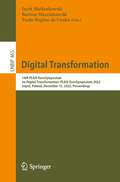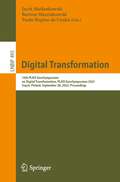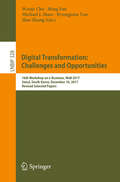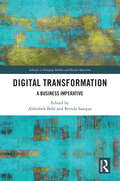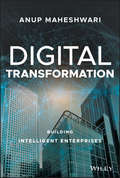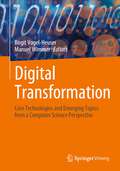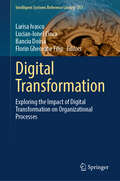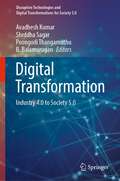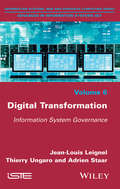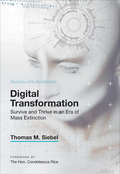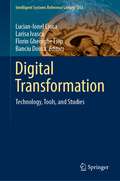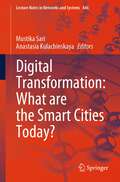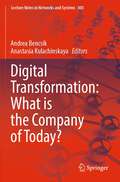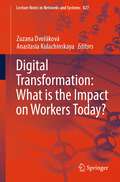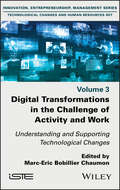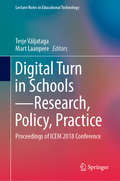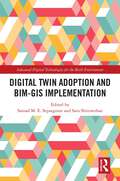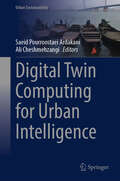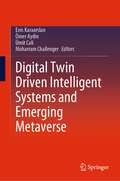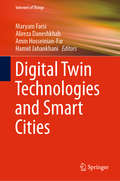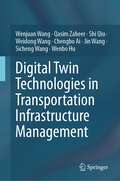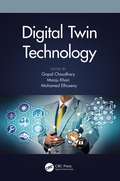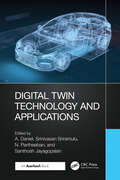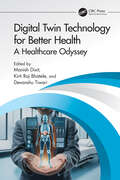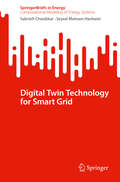- Table View
- List View
Digital Transformation: 14th PLAIS EuroSymposium on Digital Transformation, PLAIS EuroSymposium 2022, Sopot, Poland, December 15, 2022, Proceedings (Lecture Notes in Business Information Processing #465)
by Paulo Rupino da Cunha Jacek Maślankowski Bartosz MarcinkowskiThis book constitutes the refereed proceedings of the 14th PLAIS EuroSymposium 2022 which was held in Sopot, Poland, on December 15, 2022. The objective of the PLAIS EuroSymposium is to promote and develop high quality research on all issues related to digital transformation. It provides a forum for IS researchers and practitioners in Europe and beyond to interact, collaborate, and develop this field. The leading topic for the EuroSymposium this year was “Digital Transformation”. The 8 papers presented in this volume were carefully reviewed and selected from 23 submissions. They were organized in topical sections named: artificial intelligence; creativity and innovations; big data, internet of things and blockchain technologies.
Digital Transformation: 15th PLAIS EuroSymposium on Digital Transformation, PLAIS EuroSymposium 2023, Sopot, Poland, September 28, 2023, Proceedings (Lecture Notes in Business Information Processing #495)
by Paulo Rupino da Cunha Jacek Maślankowski Bartosz MarcinkowskiThis book constitutes the proceedings of the 15th PLAIS EuroSymposium on Digital Transformation, PLAIS EuroSymposium 2023, which took place in Sopot, Poland, in September 2023. The primary objective of the PLAIS EuroSymposium 2023 was to foster discussions on general issues pertaining to digital transformation and related topics. The papers selected this year are related to the use of machine learning, internet of things and social media. The 7 full papers included in this volume were carefully reviewed and selected from a total of 22 submissions.
Digital Transformation: 16th Workshop On E-business, Web 2017, Seoul, South Korea, December 10, 2017, Revised Selected Papers (Lecture Notes in Business Information Processing #328)
by Han Zhang Michael J. Shaw Ming Fan Wooje Cho Byungjoon YooThis book constitutes revised selected papers from the 16th Workshop on e-Business, WeB 2017, which took place in Seoul, South Korea, in December 2017. The purpose of WeB is to provide an open forum for e-Business researchers and practitioners world-wide, to share topical research findings, explore novel ideas, discuss success stories and lessons learned, map out major challenges, and collectively chart future directions for e-Business. The WeB 2017 theme was “Digital transformation: challenges and opportunities”. The 11 papers presented in this volume were carefully reviewed and selected from 43 submissions. These are original research articles with a broad coverage of behavioral issues on consumers, citizens, businesses, industries and governments, ranging from technical to strategic issues.
Digital Transformation: A Business Imperative (Advances in Emerging Markets and Business Operations)
by Edited by Abhishek Behl and Brinda SampatDigitization, with the help of artificial intelligence, machine learning, social media, and cloud adoption, has significantly transformed industries and helped companies accelerate, grow, and have a competitive edge. This book discusses how digital transformation can help organizations achieve growth and explores the challenges of using emerging technologies.Digital disruption has a significant effect on how businesses operate. Organizations must follow a strategic approach while on the path to digital transformation as their technology and operational decisions must be aligned. This volume provides a roadmap for businesses to adopt digital solutions and systems in all aspects of a company’s functioning. With case-based examples, the book demonstrates how organizations globally use digital technologies to enhance their business operations; examines strategies that work and those that do not; highlights lessons organizations can learn from the success and failures of digitization; and looks at the perils of using such technology, which can often also endanger the organization's functioning and raise consumer privacy concerns.Part of the Advances in Emerging Markets and Business Operations series, this volume includes examples and best practices from companies that provide a framework for designing a digital strategy. It will be useful for students and researchers of business studies, management studies, human resources, organization studies, IT management, and information and communication. It will also be of interest to organizations and managers.
Digital Transformation: Building Intelligent Enterprises
by Anup MaheshwariBuilding Intelligent Enterprises by leveraging the emerging and next-generation technologies to accelerate the adoption of digital transformation The speed of innovation and emerging IT technologies are changing at a very fast pace and enterprises are eager to join the digital revolution so they can stand above the competition and succeed as the enterprise of tomorrow. This book is an attempt to make the enterprise intelligent by providing the path to digital transformation and the adoption of new IT methods, tools and technologies. This book has been organized to cover the following topics: Digital Transformation, Design Thinking, Agile, DevOps, Robotic Process Automation, Internet of Things, Artificial Intelligence, Machine Learning, Blockchain, Drones, Augmented and Virtual Reality, 3D Printing, Big Data, Analytics, Cloud Computing, APIs, and SAP Leonardo. No prior knowledge of any technical coding or language is necessary to understand the content of this book. End-to-end storyline to accelerate the enterprise’s digital transformation journey How an enterprise can stay relevant, compete, and perform in the digital economy How to leverage these technologies to build intelligent enterprises Understand and apply the emerging technologies across key business processes Industry-specific Use Cases for all technologies as a reference point to build the business case for implementation The book is very well suited towards the C-Suite executives, both IT and business leaders, directors and managers, project managers, solution architects, and all professionals who have an interest and desire to keep up-to-date with the latest technological trends, looking for a career change, want to help enterprise adapt and onboard the digital roadmap, or have an agenda to digitize key processes within the enterprise to make it intelligent.
Digital Transformation: Core Technologies and Emerging Topics from a Computer Science Perspective
by Manuel Wimmer Birgit Vogel-HeuserDigital Transformation in Industry 4.0/5.0 requires the effective and efficient application of digitalization technologies in the area of production systems. This book elaborates on concepts, techniques, and technologies from computer science in the context of Industry 4.0/5.0 and demonstrates their possible applications. Thus, the book serves as an orientation but also as a reference work for experts in the field of Industry 4.0/5.0 to successfully advance digitization in their companies.
Digital Transformation: Exploring the Impact of Digital Transformation on Organizational Processes (Intelligent Systems Reference Library #257)
by Florin Gheorghe Filip Larisa Ivascu Lucian-Ionel Cioca Banciu DoinaThe book offers aspects related to the health and process safety field, complex approaches to artificial intelligence, the role of accounting and auditing in the digital age, DT in agriculture, artificial intelligence in the maritime domain, education, management, sustainability and mobile technologies in learning. Digitization, digitalization and digital transformation (DT) are important for public organizations and private organizations. Despite their importance, these steps are approached differently in organizations. Public organizations emphasize the importance of digital transformation, while public organizations make efforts to align themselves with citizens' demands from a digitalization perspective. Incorporating technologies into organizational processes has become a priority for all industries to lead to important changes. All these activities are covered by the digital transformation that can lead to increased efficiency, agility, innovation and the unlocking of organizational values. Through this complex approach, the book contributes to the completion of knowledge in the field of digital transformation, develops and anticipates new research directions. It is addressed to professionals, practitioners, researchers, students and other interested parties.
Digital Transformation: Industry 4.0 to Society 5.0 (Disruptive Technologies and Digital Transformations for Society 5.0)
by B. Balamurugan Avadhesh Kumar Shrddha Sagar Poongodi ThangamuthuThis book focuses on computing for Industry 4.0 illustrating different domains with the purpose of integration with existing domains for automation of processes. It gives readers an idea about the various challenges and design structure for computing of Industry 4.0. The contents include contributions from experts in Cyber-Physical Systems (CPS), the Internet of Things (IoT), Industrial Internet of Things (IIoT), cloud computing, cognitive computing, and artificial intelligence across the world, contributing their knowledge to identify the different characteristics of the above domains.
Digital Transformation: Information System Governance
by Adrien Staar Jean-Louis Leignel Thierry UngaroThe main aim of this book is to offer companies a simple and practical method to assess their maturity in the Governance Information System, so that they are in working order to face the challenges of Digital Transformation. How can companies effectively manage their investment in IT systems and make the most of their development?
Digital Transformation: Survive and Thrive in an Era of Mass Extinction
by Thomas M. SiebelFrom visionary Silicon Valley entrepreneur Tom Siebel comes a penetrating examination of the new technologies that are disrupting business and government_x2014_and how organizations can harness them to transform into digital enterprises. The confluence of four technologies_x2014_elastic cloud computing, big data, artificial intelligence, and the internet of things _x2014_writes Siebel, is fundamentally changing how business and government will operate in the 21st century. Siebel masterfully guides readers through a fascinating discussion of the game-changing technologies driving digital transformation and provides a roadmap to seize them as a strategic opportunity. He shows how leading enterprises such as Enel, 3M, Royal Dutch Shell, the U.S. Department of Defense, and others are applying AI and IoT with stunning results. Digital Transformation is the guidebook every business and government leader needs to survive and thrive in the new digital age.
Digital Transformation: Technology, Tools, and Studies (Intelligent Systems Reference Library #253)
by Florin Gheorghe Filip Larisa Ivascu Lucian-Ionel Cioca Banciu DoinaThis book presents a multidisciplinary approach to digital transformation process of organizational transformation, offering support throughout the implementation process to all those interested. The digital transformation (DT) is a priority for many companies in the context of technological evolution. The use of appropriate tools, methodologies, methods, approaches, and techniques for DT, depending on the organizational characteristics, can contribute to a complete approach to organizational processes and to their efficiency. Digital transformation involves the adoption and use of new digital technologies to develop new products and services, modify existing ones and develop new business models to increase efficiency, productivity, and competitiveness. Starting from marketing to culture and education to health, automotive, engineering, mobility and human resources and others, it is addressed to professionals, practitioners, researchers, students, and other interested parties.
Digital Transformation: What are the Smart Cities Today? (Lecture Notes in Networks and Systems #846)
by Anastasia Kulachinskaya Mustika SariThis book presents various models and approaches, specific proposals, and recommendations on a whole range of areas for smart cities' development. This book proposes to look at the problem through a broad overview of all elements of a smart city as a single system: smart governance, smart buildings, smart transportation, smart tourism destinations, smart economy, and smart environment. The book is intended for both young and experienced scientists who want to get acquainted with the latest trends and data for using them in their research.
Digital Transformation: What is the Company of Today? (Lecture Notes in Networks and Systems #805)
by Anastasia Kulachinskaya Andrea BencsikThis book offers the latest research on organizational management, knowledge management, organizational functioning, organizational digitalization, and other issues of modern company development. The book proposes to look at the pool of these problems through the prism of building various models for implementing digital transformation of business and processes. This book is intended for both young and experienced scientists who want to get acquainted with latest trends and data to use them in their research.
Digital Transformation: What is the Impact on Workers Today? (Lecture Notes in Networks and Systems #827)
by Zuzana Dvořáková Anastasia KulachinskayaThis book offers the latest research on formation of modern workers in the context of digitalization: from constant improvement of new training technologies to growing requirements for employees in workplace, as well as an assessment of specialists' digital skills and dynamics of changes over the past years. The book proposes to look at the pool of these problems through the prism of acquisition of new digital competencies and requirements for a modern worker. This book is intended for both young and experienced scientists who want to get acquainted with latest trends and data to use them in their research.
Digital Transformations in the Challenge of Activity and Work: Understanding and Supporting Technological Changes
by Marc-Eric Bobillier ChaumonTECHNOLOGICAL CHANGES AND HUMAN RESOURCES SET Coordinated by Patrick Gilbert The accelerating pace of technological change (AI, cobots, immersive reality, connected objects, etc.) calls for a profound reexamination of how we conduct business. This requires new ways of thinking, acting, organizing and collaborating in our work. Faced with these challenges, the Human and Social Sciences have a leading role to play, alongside others, in designing, supporting and implementing these digital transformation projects. Their ambition is to participate in the development of innovative and empowering devices, that is to say, systems that are truly at the service of human beings and their activity, that empower these professionals to take action and that also provide occupational health services. This book takes a multidisciplinary look at the challenges of these digital transformations, making use of occupational psychology, ergonomics, sociology of uses, and management sciences. This viewpoint also helps provide epistemological, methodological and empirical insights to better understand and support the changes at work.
Digital Turn in Schools—Research, Policy, Practice: Proceedings of ICEM 2018 Conference (Lecture Notes in Educational Technology)
by Mart Laanpere Terje VäljatagaThis volume is a compilation of selected papers that were presented at the annual conference of the International Council of Educational Media (ICEM) in Tallinn, Estonia, on September 5 - 7, 2018. The book reports on recent interdisciplinary research and innovative practices regarding school-wide implementation of digital innovation and connects it with recent developments in the field of educational media. The key concept is “Digital Turn,” which is understood as a socio-technical transition towards next-generation digital learning ecosystems in education. Although Digital Turn can also be implemented at the classroom or national levels, most of the contributions in this volume take a whole-school perspective on the policies and practices regarding digital innovation, educational media, e-assessment, digital competences of teachers and students as well as learning design and learning analytics.
Digital Twin Adoption and BIM-GIS Implementation (Advanced Digital Technologies for the Built Environment)
by Sepasgozar, Samad M. E. Sara ShirowzhanThe aim of this edited book volume is to present new concepts, and applications of Digital Twin and relevant tools in the built environment context. The book identifies key organisational factors that influence the adoption of technology within the architectural service industry, setting the stage for a deeper understanding of the shift towards digital methodologies.The book introduces the Digital Twin Readiness Level framework, a modified metric system with ten levels of risk‑based maturity and an empirical development of a Digital Twin Adoption Model. Furthermore, the text ventures into immersive virtual environments and their applications, showcasing innovative practices that enhance learning and operational efficiency.Additionally, the book examines the integration of Building Information Modelling (BIM) and Geographic Information Systems (GIS), revealing new workflows for creating 3D models of cities. A focus on Australia’s government‑funded infrastructure projects offers insights into the values and acceptance criteria for these technologies, providing a comprehensive overview of their practical implications and future potential. This book is essential reading for practitioners, engineers, and managers involved in any phase of the built environment from design to operation and other architectural, engineering, and construction (AEC) stakeholders who are a part of digital transformations, as well as researchers, educators, and students interested in the field.
Digital Twin Computing for Urban Intelligence (Urban Sustainability)
by Ali Cheshmehzangi Saeid Pourroostaei ArdakaniDigital Twin Computing for Urban Intelligence focuses on new and ongoing discourses in interdisciplinary research and practice in urban system and smart city development pathways. It approaches digital twin fundamentals and principals including theoretical foundations, conceptualisations, strategies and services/patterns to define and adapt digital twin solutions for urban applications - mainly sustainability. This book highlights promising case studies and outlines digital twin design models and system architecture by examining key digital twin deployment practices such as data analysis, decision making, and service automation in the line with intelligent urban planning. It also emphasises on DT technologies such as cloud computing, AI, IoTs, and smart virtualisation and outlines the key benefits of the DT solutions in urban applications - mainly control and planning. This book is intended for a wide range of audiences, including interested layperson audiences, undergraduate and graduate students in university, and researchers. The key benefits of this book are: 1- To introduce the theoretical principles and fundamentals of DT computing for urban intelligence. 2- To present the state-of-the-art DT technologies in urban planning and control. 3- To describe the practical deployment process of DT computing solutions for urban sustainability and intelligence.
Digital Twin Driven Intelligent Systems and Emerging Metaverse
by Enis Karaarslan Ömer Aydin Ümit Cali Moharram ChallengerThis book covers the notion of the digital twin, which has the potential to alter the way systems are governed and manufactured. It also addresses the metaverse as an emerging technology with its roots in literature, cross-platform avatars, and artificial intelligence-oriented cybersecurity issues. The untapped potential of the metaverse and digital twins as enabling technologies for the next-generation industries is emphasized in various chapters. Digital twin technology enables manufacturers to comprehend their products throughout product design better, integrate simulation, tracking, and optimization in real-time, and appropriately analyze operations. Especially for complicated products or systems, testing on a digital twin is more efficient (more accessible, quicker, less error-prone, and less expensive). The product is examined in its virtual version before it is displayed in the actual world. Additionally, the digital twin minimizes operational expenses and increases the longevity of equipment and assets. By prolonging the life of the thing, they represent and enhance its working efficiency; it may minimize operating costs and prospective capital spending. The digital twin idea is becoming a reality as it has begun to be used in several industries, including energy, manufacturing, construction, transportation, aerospace, smart cities, healthcare, cyber security, finance, and agriculture. Academic and industrial experts highlighted the most compelling use cases of digital twins and metaverses and the challenges inherent in their implementation. Readers who want to make more effective systems will find the book useful. Also, people who want to get an idea and vision of how technology will change our lives will benefit from this book.
Digital Twin Technologies and Smart Cities (Internet of Things)
by Hamid Jahankhani Amin Hosseinian-Far Maryam Farsi Alireza DaneshkhahThis book provides a holistic perspective on Digital Twin (DT) technologies, and presents cutting-edge research in the field. It assesses the opportunities that DT can offer for smart cities, and covers the requirements for ensuring secure, safe and sustainable smart cities. Further, the book demonstrates that DT and its benefits with regard to: data visualisation, real-time data analytics, and learning leading to improved confidence in decision making;reasoning, monitoring and warning to support accurate diagnostics and prognostics;acting using edge control and what-if analysis; andconnection with back-end business applications hold significant potential for applications in smart cities, by employing a wide range of sensory and data-acquisition systems in various parts of the urban infrastructure. The contributing authors reveal how and why DT technologies that are used for monitoring, visualising, diagnosing and predicting in real-time are vital to cities’ sustainability and efficiency. The concepts outlined in the book represents a city together with all of its infrastructure elements, which communicate with each other in a complex manner. Moreover, securing Internet of Things (IoT) which is one of the key enablers of DT’s is discussed in details and from various perspectives. The book offers an outstanding reference guide for practitioners and researchers in manufacturing, operations research and communications, who are considering digitising some of their assets and related services. It is also a valuable asset for graduate students and academics who are looking to identify research gaps and develop their own proposals for further research.
Digital Twin Technologies in Transportation Infrastructure Management
by Jin Wang Weidong Wang Wenjuan Wang Qasim Zaheer Shi Qiu Chengbo Ai Sicheng Wang Wenbo HuThis book reveals the power of digital twin technologies in terms of optimizing the performance and maintenance of infrastructure assets. From roads, bridges, and tunnels to airports and smart cities, it will guide you through the latest advances in and use cases on this cutting-edge technology. You will come to understand the challenges involved in the development of digital twins and learn about the initiatives and projects underway to overcome them. Explore the potential of this technology in terms of reducing costs, improving system performance, and enhancing the overall infrastructure experience for users. Get ready to embark on a journey of understanding the future of transportation infrastructure management with digital twin technologies.
Digital Twin Technology
by Mohamed Elhoseny Manju Khari Gopal ChaudharyMost of the business sectors consider the Digital Twin concept as the next big thing in the industry. A current state analysis of their digital counterparts helps in the prediction of the future of physical assets. Organizations obtain better insights on their product performance through the implementation of Digital Twins, and the applications of the technology are frequently in sectors such as manufacturing, automobile, retail, health care, smart cities, industrial IoT, etc. This book explores the latest developments and covers the significant challenges, issues, and advances in Digital Twin Technology. It will be an essential resource for anybody involved in related industries, as well as anybody interested in learning more about this nascent technology. This book includes: The future, present, and past of Digital Twin Technology. Digital twin technologies across the Internet of Drones, which developed various perceptive and autonomous capabilities, towards different control strategies such as object detection, navigation, security, collision avoidance, and backup. These approaches help to deal with the expansive growth of big data solutions. The recent digital twin concept in agriculture, which offers the vertical framing by IoT installation development to enhance the problematic food supply situation. It also allows for significant energy savings practices. It is highly required to overcome those challenges in developing advanced imaging methods of disease detection & prediction to achieve more accuracy in large land areas of crops. The welfare of upcoming archetypes such as digitalization in forensic analysis. The ideas of digital twin have arisen to style the corporeal entity and associated facts reachable software and customers over digital platforms. Wind catchers as earth building: Digital Twins vs. green sustainable architecture.
Digital Twin Technology and Applications
by Srinivasan Sriramulu A Daniel N Partheeban Santhosh JayagopalanThe Fourth Industrial Revolution is being accelerated by the digital twin technological revolution, which converges intelligent technologies and defines the connectivity between physical and digital items. The Internet of Things (IoT) connects the real and digital worlds, allowing connected items to deliver a vast array of services to internet users. IoT devices create large amounts of data that may be fed into AI systems for decision- making. In a decentralized architecture, digital twin technology may be utilized to protect platforms and create smart contracts. Digital twins decentralized ledger, immutability, self- sovereign identification, and consensus procedures hold a lot of promise for improving AI algorithms. Furthermore, leveraging smart contracts in a digital twin system to facilitate user interaction via IoT might have a big influence, and this integrated platform is expected to revolutionize many fields.Digital Twin Technology and Applications examines the problems, issues, and solutions for using big data to enable streaming services using IoT and AI with digital twin technology. The IoT network concept is the key to success, and to establish a solid IoT platform on which large data transmission may take place, it must handle protocol, standards, and architecture. The book provides insight into the principles and techniques of IoT and AI. It explores the idea of using blockchain to provide security in a variety of sectors. The book also covers the application of integrated technologies to strengthen data models, improve insights and discoveries, innovate audit systems, as well as digital twin technology application to intelligent forecasting, smart finance, smart retail, global verification, and transparent governance.
Digital Twin Technology for Better Health: A Healthcare Odyssey
by Kirti Raj Bhatele Manish Dixit Devanshu TiwariAt a time when technology and healthcare are colliding to alter lives, Digital Twin Technology for Better Health: A Healthcare Odyssey throws open the revolutionary possibilities of digital twins in changing patient care, medical research, and healthcare operations. This book brings together the best of the best from healthcare, AI, and IT domains in providing a holistic and forward- looking study of one of the most innovative technologies of our times. Digital twin technology generally refers to the development of virtual replicas of physical entities. The functioning of healthcare systems is being transformed using this technology. Its applications lie in personalized treatment plans, predicting diagnostics results, optimized workflows in hospitals, and aid in the drug discovery process. The book examines the principles of digital twin technology in healthcare and their application in the real world and future directions. Features: Foundations and evolution of digital twin technology Applications in clinical care, including diagnosis, treatment, and patient monitoring Insights into how digital twins are changing the face of healthcare operations and management Case studies and practical examples illustrating real- world success stories Critical discussions on data security, ethical considerations, and regulatory frameworks Emerging trends and the integration of AI, IoT, and advanced analytics to enhance digital twin efficacy Whether you are a healthcare professional, technologist, researcher, or policymaker, this book is an indispensable guide to the science of how digital twin technology can help deliver better health. It is one of the earliest comprehensive works in the field and not only fills the gap between technology and healthcare but also serves as a visionary roadmap for the future. Let’s join in on this transition journey in healthcare toward the future, as digital twins promise to reshape the industry and change lives around the world.
Digital Twin Technology for Smart Grid (SpringerBriefs in Energy)
by Sabrieh Choobkar Seyed Mohsen HashemiThe traditional power grid has been revolutionized in recent years, and its different domains are improving to form a new smart grid. To better understand smart electricity grid and recommend how its domains function best, a comprehensive look at the power system in parallel with digitalization revolution is required. Recent digital twin (DT) technology promises to enhance industries, including smart grids, and this book studies DT architecture and its applications and benefits. Coverage includes DT solutions for smart grid domains and subsystems and describes advantages of employing DT in the smart grid. The book&’s concept is based on merging DT technology with smart grid applications. Its structure follows an understanding of DT concepts and applications in smart grid domains. Digital Twin Technology for Smart Power Grid will be a valuable reference for power industry practitioners, researchers, and students. It explains the new digital twin technology and how it can enhance the current electricity system toward a smarter power grid.
